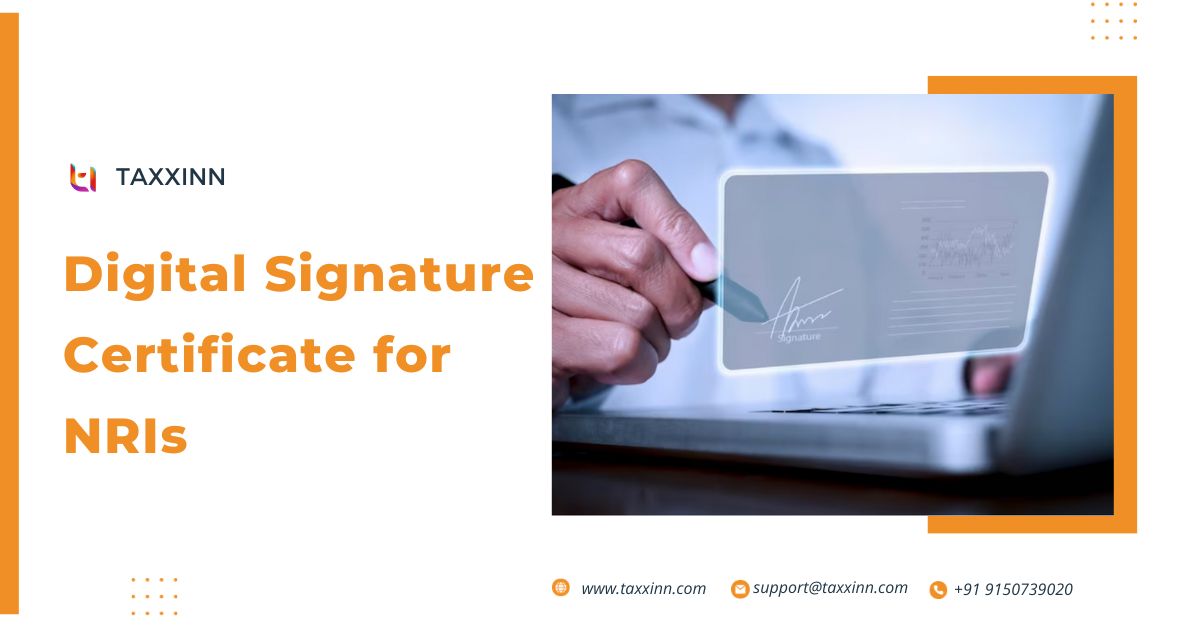Secure electronic signatures have become a necessity, not only for Indian residents but also for foreign nationals and Non-Residential Indians (NRIs) engaged in various activities within India. Digital Signature Certificates (DSCs) have emerged as indispensable tools for ensuring the authenticity and legality of electronic transactions and documents in this context. So, the DSC for NRIs is essential these days.
DSCs, the digital equivalents of handwritten signatures, serve as electronic markers that validate the signatory’s identity and document integrity. As the world shifts toward paperless transactions and digital record-keeping, foreign nationals and NRIs increasingly rely on DSCs to conduct business transactions, comply with legal regulations, engage in digital banking, file income taxes, and access e-governance services in India.
Digital signature certificates for NRIs offer flexibility and find utility in a wide array of situations, spanning from online transactions to official government documentation and legal agreements.
Class 3 DSC for NRIs
A Class 3 Digital Signature Certificate (DSC) is a high-level certificate that provides the highest level of security and authenticity. This type of certificate is commonly used for various online transactions, especially in India, and can also be obtained by foreign nationals.
Foreign nationals, like Indian residents, may require a Class 3 DSC for various purposes, including:
1. Business Transactions: Foreign nationals involved in business activities in India may need a Class 3 DSC for digitally signing and submitting documents related to company registration, tax filings, and other business transactions.
2. Income Tax Filing: If foreign nationals earn income in India and need to file income tax returns, they may require a Class 3 DSC to electronically sign and submit these returns securely.
3. e-Governance Services: Foreign nationals may use Class 3 DSCs to access e-governance services in India, such as applying for government licenses, permits, and certifications.
4. Legal Documentation: For signing legal contracts, agreements, and other important legal documents, a Class 3 DSC can ensure the authenticity and integrity of the digital signatures.
Benefits of Class 3 DSC
Using a Class 3 DSC comes with many advantages. Here are some of the benefits:
1. High-Level Security: A Class 3 DSC provides strong security for your data, keeping it safe from unauthorised access.
2. Verified Identity: It digitally confirms your identity when you use it on government websites.
3. Simplifies Transactions: It makes tasks like filing income tax returns, participating in e-tenders, e-auctions, and other services easier.
4. Efficient Document Signing: With a Class 3 DSC, you can digitally sign many documents or forms quickly and easily from anywhere, saving time, money, and effort.
5. Domain Ownership: It helps you prove that you own a domain, which is essential for online businesses and website owners.
6. Protection Against Cyber Threats: This DSC protects against cyber threats, ensuring your online activities are secure.
Documents Required for DSC of NRI Individuals
- Passport / Government issued ID proof
- Attested copy of VISA
- Attested copy of Resident Permit Certificate
- Proof of address
- Tax identification number
- PAN card
Documents required to obtain DSC for NRI Organisations
- Employee ID proof of the applicant or authorised signatory.
- Organisation Address Proof.
- Organisation Authorisation Letter.
- Registration/Incorporation Document.
- Applicant and Organisation details.
Procedure to Obtain DSC for NRI
The Class 3 Digital Signature Certificate for NRI or Foreign Individuals can be obtained from a Certifying Authority CA. Taxxinn is a licensed Certifying Authority (CA) that is authorised by the Controller of Certifying Authority CCA. We issue DSC to foreign individuals, companies, and organisations under the Ministry of Corporate Affairs (MCA) guidelines.
The new Aadhaar-based eKYC makes it possible to acquire a DSC without the need for your physical presence. This is achieved through In-Person Verification (IPV) conducted via a secure video call.
Here are the steps to obtain a DSC for NRIs:
1. Go to the website of the authorised Certificate Authority (CA).
2. Upload your required documents to a secure vault on the website.
3. Complete the application form, or seek assistance from the CA’s support team.
4. Undergo the In-Person Verification (IPV) via a secure video call, combined with Aadhaar-based OTP authentication.
5. Once the verification is successful, your Digital Signature Certificate will be issued, and a USB token (if applicable) will be dispatched to you.
Obtaining a DSC for NRIs has become more convenient because of the Aadhaar-based eKYC process, making it easier for individuals residing abroad to access this valuable digital tool. For further insights, be sure to check out information on estate laws for NRIs in India.
Who requires a Digital Signature Certificate?
A Class 3 Digital Signature is necessary in the following situations:
1. A partnership firm, or company, along with any other business or individual subject to a tax audit under the Income Tax Act, must use a digital signature for electronically filing their income tax returns.
2. For business filings on MCA21 (Ministry of Corporate Affairs), digital signatures are mandated for the following individuals:
- Directors
- Auditors
- Company Secretaries
- Bank Officials responsible for registration and fee payments
- Other Authorised Signatories
Conclusion
Digital Signature Certificates (DSCs) have become essential for Non-Residential Indians (NRIs) and foreign nationals engaging in various activities within India. DSCs ensure the authenticity and legality of electronic transactions and documents. Particularly, Class 3 DSCs offer heightened security, making them crucial for activities ranging from business transactions to income tax filings. The guide provides a detailed overview, of the necessity, benefits, and documents required for DSC for NRIs. NRIs and foreign nationals can reach out to Taxxinn to obtain a DSC online securely and legally within the Indian context.
Related Reads,


